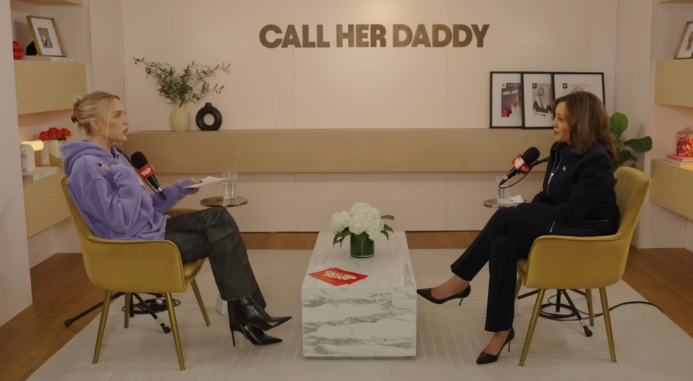WASHINGTON — In the final weeks before Election Day former President Donald Trump and Vice President Kamala Harris are turning to nontraditional media platforms to reach key voter groups crucial to their campaign strategies.
While these approaches have proven effective at connecting with young, independent voters, some experts say interviews conducted by non-journalists lack the level of scrutiny typically offered by mainstream media.
“There’s really no standard for journalism prevalent on social media and on podcast-style platforms,” said Jessica Feezell, an associate professor of political science at the University of New Mexico. “The journalists who study journalism…are trained in asking politicians important questions in a way that elicits the information that the American public needs, and in a market based media system, the American public is not necessarily craving deep policy information.”
According to Feezell, podcasts provide an opportunity for both candidates to reach disengaged voters, a crucial demographic in a polarized election. Of these listeners, many are “choosing different types of entertainment and information” from nontraditional media.
Feezell also pointed out that the interviewers often feel fortunate to land such high-profile guests and are less likely to criticize them.
“Generally, they’re not going to go heavy against these candidates,” she said. “I haven’t seen the same level of watchdog press that comes from traditional media. We’re likely to see a decline in the quality of information and the extent to which the media holds elected officials accountable.”
Mark Lukasiewicz, the Dean of the Lawrence Herbert School of Communication at Hofstra University, also expressed concerns about how the rise of social media and other nontraditional platforms may impact the political climate.
“Our political dialogue has gotten worse, less respectful, and critically, far less fact-based,” he said. “Social media has amplified misinformation and disinformation, and candidates, or groups supporting them, have capitalized on this.”
A Pew Research study also found that nearly nine in ten podcast listeners expect the news they hear to be accurate—reflecting a higher level of trust than people have in some other sources of news and information. This shift, combined with both candidates’ frequent use of podcast platforms, raises concerns about the quality of information reaching voters.
A few weeks ago, Harris was a guest on All the Smoke, hosted by former NBA players Matt Barnes and Stephen Jackson. The show’s audience is largely male, suggesting that Harris is aiming to strengthen support among younger, non-white men.
“Each campaign is going to look to make inroads where they need to. For example, current polling suggests Vice President Harris is underperforming with Black men compared to past Democratic candidates,” Lukasiewicz said.
Harris appeared on the podcast Call Her Daddy, hosted by Alex Cooper. The podcast describes itself as “the most-listened to podcast by women.” Before the interview, Cooper acknowledged that her goal was not to influence how people vote but to engage in a conversation about women’s bodies.
Trump has similarly engaged in several podcasts, including This Past Weekend with Theo Von, and The Lex Fridman Podcast. These shows are popular among young, white male listeners, an audience Trump is focused on energizing.
Despite criticism over the lack of traditional media interviews done during this election cycle, Trump and Harris have still participated in some.
While Harris sat down for an interview on 60 Minutes, which has interviewed every presidential candidate since 1968, Trump opted out, instead hosting the majority of his interviews on Fox and NewsMax, both conservative-friendly networks. Trump also declined another presidential debate to be hosted by Fox earlier this month, claiming debates do not typically occur so close to Election Day.
Harris also appeared on Fox News last week for an interview with Bret Baier, drawing 7.8 million viewers, according to the network. Her campaign called the combative interview a win.
“We feel like we definitely achieved what we set out to achieve in the sense that she was able to reach an audience that has probably not been exposed to the arguments she’s been making on the trail, and she also got to show her toughness in standing tall against a hostile interviewer,” Brian Fallon, a communications adviser for the Harris campaign, stated in an interview with The Hill after the event.
As Trump and Harris navigate a media landscape increasingly dominated by nontraditional outlets, the long-term effects on voter behavior and the broader political discourse remain uncertain.

